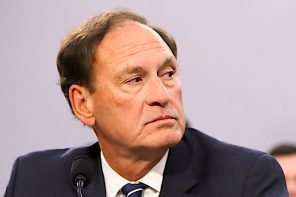Today is the deadline for comments on regulations under the Patient Protection and Affordable Care Act, and the religious exemption has continued to draw controversy. To recap: The exemption says that if you are an employer you must provide contraception and sterilization as part of your employees’ health coverage, unless you are a religious institution opposed to contraception and sterilization and you primarily employ adherents of your own religion. A group of theologians (many of whom are RD contributors) sent a letter to HHS Secretary Kathleen Sebelius urging her not to heed calls for a broader religious exemption. Catholic Bishops, and heads of Catholic universities—including the president of one of my almae matres —have asked for more wiggle room.
Let’s talk about the situation this is meant to address: Say you’re not Catholic, and say you—along with hundreds or thousands of other non-Catholics—are employed by a particular Catholic university or hospital. Your job comes with health benefits. Yay! Good for you! And you, not being Catholic and having no qualms with contraception or sterilization, would like to avail yourself of those services. Under the Patient Protection and Affordable Care Act, you would be able to access those services. If you were Catholic, or more accurately if you were one of the extremely small minority of U.S. Catholics who agree with and follow the church’s official prohibition of artificial contraception… well, presumably you would not use those services.
Ah, but what about the employers and their consciences? The religious exemption, whether it was intended to or not, essentially places the choice upon them: Do they want to be able to act as though contraception isn’t part of basic health care, that it’s a moral evil, and that nobody under their authority should be able to access it? Okay then. Turns out that among the general population of… well… everybody out there who needs health care, that’s actually a really obscure belief. So perhaps those institutions should be sure only to hire and treat people who adhere to that belief, sidelining though that practice might be.
On the other hand, if they aren’t going to insist that the phlebotomist attach her baptismal certificate to her job application, or require the twice-married R. L. Knudelpantz Endowed Chair of the Study of Fusty Trivilialities to show proof that his first marriage was validly annulled according to Catholic canon law… well, then no. They don’t get to deny to their workers access to health care services that 99 percent of American adults use. And if they’re a Catholic hospital system that receives public money and participates in the wider system of health care licensure and mergers and ambulance services and insurance networks—basically, if they are part of the health care delivery ecosystem enough that their decisions affect public health in serious ways—then, no, they can’t say “But in this one very particular circumstance we are going to invoke our privilege to deny basic health care based on a tiny minority opinion that most Catholics don’t even believe.” Implicitly, this is the choice pressed by the religious exemption, as it stands.
To be sure, it takes some nerve to issue an ultimatum to the Catholic health care system—which is why this exemption is something to watch. It may even be emblematic, in an increasingly secular age, of how some people think religious institutions should position themselves. Meanwhile, though, close to 1/5 of all hospitals in the United States are Catholic, and they receive (as I think they should) public funds. Nobody wants or expects that Catholic hospitals would opt to become tiny refuges for those who actually follow Catholic teaching in every last detail. At the same time, there’s something to be said for how the exemption calls upon institutions to decide whether they want to be islands of faithfulness in a sea of immorality, or whether they want to participate in the same public health conversation that most everyone else is having: the conversation in which contraception is just simply something that most people use, and that makes a lot of people’s lives better. Access to affordable contraception has public health implications that help a whole lot of people—particularly poor women. In this piece by Sharon Lerner (which: seriously, go read it!), she starkly portrays what unintended pregnancies mean for poor women:
About half of all pregnancies in this country are unplanned, with poor women now five times more likely than higher-income women to have an unplanned pregnancy, and six times more likely to have an unplanned birth, according to the Guttmacher Institute’s recent analysis of government data… Poorer women suffer when they have unintended births—as do their children. Research shows that women with unplanned pregnancies are more likely to smoke, drink, and go without prenatal care. Their births are more likely to be premature. Their children are less likely to be breastfed, and more likely to be neglected and to have various physical and mental health effects. Then, reinforcing the cycle, the very fact of having a child increases a woman’s chances of being poor.
There are domains where people say “But those women should just [not have sex/use NFP/love babies/rely on God for help/be more like me and the people I approve of].” It seems increasingly hard, at least to me, to imagine public health as a conversation in which those notions, even if they were straightforwardly true for all people in all circumstances, contribute much to the task at hand.




